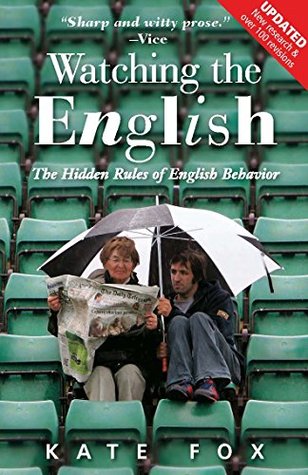More on this book
Community
Kindle Notes & Highlights
by
Kate Fox
Read between
March 15 - March 23, 2022
It is only in mixed-sex groups, where there are women to impress, that the proportion of male conversation time devoted to these more ‘highbrow’ subjects increases dramatically, to between 15 and 20 per cent.
In fact, research has revealed only one significant difference, in terms of content, between male and female gossip: men spend much more time talking about themselves. Of the total time devoted to conversation about social relationships, men spend two-thirds talking about their own relationships, while women talk about themselves just one-third of the time.
Nor am I saying that English conversation codes do not allow men to express emotion. English males are allowed to express emotion. Well, they are allowed to express some emotions. Three, to be precise: surprise, providing it is conveyed by expletives; anger, generally communicated in the same manner; and elation/triumph, which again often involves shouting and swearing.
But the upper class don’t say ‘I’ at all if they can help it: one prefers to refer to oneself as ‘one’. In fact, they are not too keen on pronouns in general, omitting them, along with articles and conjunctions, wherever possible – as though they were sending a frightfully expensive telegram.
A journey without reading matter has always been torture for many English passengers, particularly on the Underground, where there is nothing to see out of the windows and passengers sit in long rows facing each other, which makes accidental eye contact with those opposite you very hard to avoid. In desperation, we resort to reading every word of the advertisements and Underground maps above their heads,68 studying the safety instructions, scrutinising the small print on our tickets, digging out crumpled old chocolate-bar wrappers from our bags and reading the lists of ingredients . . .
...more
We indignantly disapprove of those who avoid work – from rich aristocrats at the top of the social scale to the alleged ‘benefits scroungers’ at the bottom – but this reflects our strict, almost religious belief in fair play,
We are not keen on dramatic change, revolutions, sudden uprisings and upheavals. A truly English protest march would see us all chanting: ‘What do we want? GRADUAL CHANGE! When do we want it? IN DUE COURSE!’
Britt O'Duffy and 1 other person liked this
I say ‘she’ because this test only works reliably on women: men are often blissfully unaware of the yawning social gulf between M&S knickers and an M&S patterned dress.
Britt O'Duffy liked this
The Royal Society for the Prevention of Cruelty to Animals was established more than half a century before the National Society for the Prevention of Cruelty to Children, which appears to have been founded as a somewhat derivative afterthought.
Britt O'Duffy liked this
The upper classes regard showing dogs and cats as rather vulgar, but showing horses and ponies is fine. There is no logic to any of this.
By focusing on the detail of the game’s rules and rituals, we can pretend that the game itself is really the point, and the social contact a mere incidental side-effect.
The English are not keen on random, unstructured, spontaneous, street-corner sociability; we are no good at this, and it makes us uneasy. We prefer to socialise in an organised, ordered manner, at specific times and places of our choosing, with rules that we can argue about, an agenda, minutes and a monthly newsletter.
Getting drunk is not an accidental by-product of the evening’s entertainment: it is the primary objective – young English revellers and holidaymakers (male and female) set out quite deliberately to achieve this goal, and they are almost invariably successful (we’re English, remember, we can get roaring drunk on non-alcoholic placebos).
anthropologists feel they have to travel to remote corners of the world and get dysentery and malaria in order to study strange tribal cultures with bizarre beliefs and mysterious customs
The English have an uneasy, difficult and largely dysfunctional relationship with clothes, characterised primarily by a desperate need for rules, and a woeful inability to cope without them.
The most truly eccentric dresser in this country is the Queen, who pays no attention whatsoever to fashion, mainstream or otherwise, continuing to wear the same highly idiosyncratic style of clothing (a kind of modified 1950s-retro look, if you had to define it in fashion-speak, but very much her own personal taste) with no regard for anyone else’s opinion. Because she is the Queen, people call her style ‘classic’ and ‘timeless’ rather than eccentric or weird, politely overlooking the fact that absolutely no one else dresses in this peculiar way. Never mind the herds of street-sheep and their
...more
Britt O'Duffy liked this
And although the working-class male’s shirt might not be pure cotton, it is quite difficult to tell just by looking, and you can’t go around pinching men’s sleeves to check the quality of the fabric.
(Here it is worth reminding ourselves again that satire is what the English have instead of revolutions and uprisings.)
Britt O'Duffy liked this
When it was alleged that Mr Blair and President Bush had actually prayed together during his visit to the White House, the media had a field day, and Blair is still denying that any such inappropriate act took place.
It is said that the English have satire instead of violent revolutions and uprisings, which makes us sound fairly harmless, until you see just how vicious our satire can be.
Britt O'Duffy and 1 other person liked this


